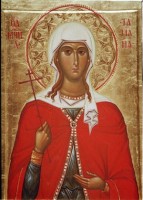July 05, 2012 Length: 22:05
 Frederica recounts the fascinating story of an Armenian woman who threw a loaf of bread into a garbage pit every day for thirteen years.
Frederica recounts the fascinating story of an Armenian woman who threw a loaf of bread into a garbage pit every day for thirteen years.
 Transcript
Transcript
In our cycle of saints, during the course of the Church year, we hear many wonderful stories. There are so many wonderful saints who have done extraordinary things. These are stories that increase our faith and show us more of what God could do with us if we were willing to be used as some of the great saints were.
There’s one little story that, when it comes up again every fall, I think about this particular person. She was a widow. We don’t know very much about her, don’t know her name, but she must have been prayerful. She lived in the Middle East in a time when it was still mostly pagan, when the Persian Empire was overrunning that whole area, but she was a Christian and a prayerful one.
She had a dream, and in the dream, God told her to do something silly. He told her: Every day, bake a loaf of bread. Bake an extra loaf, beyond what you need for your household. Bake an extra loaf of bread, and then go to that pit, the pit where they throw the garbage, the pit where all the dead donkeys and spoiled meat and everything gets tossed into. Throw the loaf of bread into the pit.
And that was it. The next day: Do it again. And the next day: Do it again.
I think about that woman and what this word from the Lord must have been like for her. Picture her: She maybe has children she’s raising. Maybe she’s poor herself; maybe she’s wealthy—we don’t know. But she was a widow, and she probably had prayed about all kinds of things. She probably prayed about her friends, and someone was sick and she’s praying for him to get well, or maybe she’s thinking she should move from her house to a different house and she’s praying about that decision, praying for the repose of her husband, praying for her children as they grow up. So many really important things would be in her mind and in her prayers.
And yet, the one thing the Lord couldn’t let her off the hook for was this thing about “Bake a loaf of bread, throw it in the garbage pit.” Every single day.
If she was like me, she would have said, “Lord, this is so clear to me. I really hear your voice telling me I have to do this every day. It doesn’t make any sense, and there’s this whole list of other things I keep asking you about. When are you going to fix this situation between my friend and her husband where they fight all the time? When are you going to make my son get back on track and a job?” Or whatever her prayer concerns were; they probably seemed very urgent to her, and yet the one thing that was coming through, loud and clear, every day, was: Bake a loaf of bread, throw it in the garbage pit. Do this over and over.
And it stank. It was horrible to go there, especially in the summer when it would get so hot. The smell must have been awful, but she was obedient, and she kept doing it—for thirteen years. Every day she baked a loaf of bread and she threw it in the pit.
Let’s back up and tell the surrounding story. When you hear the story of this saint that comes up every year, you might not even hear about the widow who threw the bread into the pit, because that’s just a small part of the story. The story goes back to Shapur, who was the head of the Persian Empire and quite a general and a soldier and man of violence. He kept attacking the people of Armenia, and they kept going back and getting even with him again. It just kept going back and forth. Shapur got so fed up with the people of Armenia, who were bold and who didn’t take it lying down but went right back and harassed his army and made encroachments on his land. He needed somebody who could be an assassin and go into Armenia, infiltrate the court, and then kill the king. He just needed to get rid of the king of Armenia.
He asked for volunteers, and there was a man named Anak who did volunteer. He had a plausible story, that he was a relation of the king of Armenia, a distant cousin. He gathered up his whole family. They went back to Armenia. He presented himself to King Khosrov and said, “I want to come and live among you. I’m through with those terrible Persians.” King Khosrov welcomed him and his family and all the retainers and servants. After some time, after he had won the confidence of the king, one day Anak said to the king, “There’s something I want to talk to you about privately. Would you come apart with me and let’s have this discussion.” The king agreed, trusting, and Anak killed him, stabbed him with a sword.
With his dying breath, King Khosrov said, “Kill Anak. Kill his family. Kill every relative, every descendant. Kill them all for killing me, for vengeance.” So the royal army, of course, turned on Anak’s family and chased them and killed them, caught them and tortured them, destroyed them. All except for one little baby boy. The nurse managed to escape with this little boy. She went all the way to Cappadocia, and she got the boy there safely. He began to live a very good life. He was raised as a Christian. He was taught; he had a good education. He grew up, got married, and had a couple of sons.
Meanwhile, on the other side, there is a son of Khosrov who survived, and this son also began to grow up. He was taken to Rome and raised there. He wasn’t raised as a Christian, however. His name was Tiridates, and Tiridates also had an excellent education and eventually, when he grew up, went back to Armenia and resumed the throne there.
Here’s where the story gets interesting. Gregory—this is St. Gregory the Illuminator—was already grown and marriedwith two sons when he learned about his father had done, had killed Tiridates’ father. Reflecting on that, Gregory left his wife and sons and went into Armenia and presented himself to King Tiridates. He didn’t tell him the backstory, but he said, “I want to come and help you and be a servant to you.” He wanted, in his heart, to make it up somehow for what his father had done. And he became very close to King Tiridates.
One time, King Tiridates went to sacrifice to the goddess and brought Gregory with him as part of his entourage or court that traveled with him. When Tiridates was through for the day and wanted to have a banquet and rest, he said to Gregory, “You stay behind. You keep on offering sacrifices to the goddess while I have dinner.” Gregory said, “I can’t do that. I can’t do that because I’m a Christian. I can’t offer sacrifice to a goddess.” This was the first time that Gregory had stood up to the king or refused to do anything. He’d always pleased him to that point, but this was where he had to draw the line.
Tiridates was outraged and tried torture and tried compelling him in very different ways. Gregory kept saying, “No. If you think that I will be able to sacrifice to these gods and goddesses that don’t even exist, you’re deranged. If you keep on doing it, you’re going to be mentally deranged from this.” Tiridates, sometimes trying to bribe Gregory to do what he wanted, sometimes trying to torture and force him, realized one thing, which was that Gregory was not afraid of dying, that if he threatened Gregory with death, that that just looked to Gregory like a quicker way to get to the presence of his Lord.
So he resolved that it would have to be by means of torture. And after he tortured him in many different ways, in trying to force him, something else happened. Somebody came to Tiridates and said, “You know this man Gregory, who has rejected your authority and embarrassed you… His father killed your father. His father, Anak, was the murderer of King Khosrov.”
With that, Tiridates tried to think of the most awful thing that he could think of, and it was this. There was a garbage pit in the city, a great, big, deep, smelly, horrible pit, where people threw their dead donkeys and their garbage and their rotten meat, and anything else that they never wanted to see again, they would throw down there. Every once in a while, a prisoner that nobody ever wanted to see again would be thrown down there, and in the darkness would do their best to live or to survive, and then, of course, die.
Imagine how surprised Gregory would be after being tossed down into the pit, maybe injured in his fall, seeing himself surrounded by darkness with one little spot of light when the sun was directly overhead. The bones of other people had been thrown down there. It’s a terrible thing, knowing that he had been tossed down there for the rest of his life, as long as it would last. He was thrown down there to be forgotten and to die.
The next morning, when the sun rose and light came down into the pit, here comes a loaf of bread, flying through the air! Somebody’s throwing a loaf—perfectly good, brand-new, warm loaf of bread—down into the pit. This went on for thirteen years. This widow, who had no idea, I’m sure, why God had told her to throw perfectly good bread into the pit, that is how Gregory managed to survive all of those years, year after year, day after day, week after week. “Bake a loaf of bread, throw it away.” Gregory, waiting in the pit: “Catch the loaf of bread. Eat it. Survive one more day.” What a story.
The next thing that happened was Diocletian was looking for a beautiful wife. A portrait was brought to him of a nun in a convent. She was so beautiful, and her name was Rhipsime. He decided that she was the one, so because he was in Armenia, he asked Tiridates, “Seize her and bring her to me.” Of course, Rhipsime refused to go, and she and some of the other nuns ran away. When she was brought before Tiridates, he fell in love with her himself, he thought she was so beautiful.
She refused, she tried to escape, she was beaten. They brought the abbess to convince her that she should go ahead and be married to Tiridates at this point who is just inflamed with love for her. The abbess, Gayane, they brought to speak to her through the keyhole where Tiridates is gripping Rhipsime and is ready to go if only she’ll agree. They’ve told Gayane what to say, and instead, she says, “Resist. Be firm in your faith. Don’t give way.” So they beat Gayane till they break all the bones in her face and all her teeth are out. Rhipsime does escape and runs, but they capture her; they torture her to death; it’s a horrible story. Many other nuns were killed along with them.
The next day, Tiridates, who has ordered this torturing and killing, wakes up and says, “Where’s Rhipsime? She’s so beautiful. Where is she? Bring her to me.” They’re saying, “Well, she’s not around any more… Yesterday…” “No, no. She has to be here!” And he was beginning to go mad. He loved Rhipsime more than ever and sought her everywhere and wouldn’t believe that she had been killed.
Step by step, he went completely insane and ended up like Nebuchadnezzar, ending up on all fours, behaving like an animal, foraging along with the wild pigs in the forests, looking for acorns. He went completely mad, as St. Gregory the Illuminator had predicted: “If you keep on worshiping those gods and goddesses, if you persist in this path, you will become deranged.” And that is what happened.
The next thing that happened was everybody was distraught because the king has lost his mind, and what can you do? They’re trying to find different cures; nothing is working. Then Tiridates’ sister—I don’t know if I can even attempt her name—Khosrovidukht, she has a dream. She is told that there is a prisoner named Gregory in the city dump, in the pit, and he only can end these torments that Tiridates is suffering. The angel in the dream says, “When Gregory comes, he will teach you the remedy for all of your ills. He will be able to cure all of your ills.”
So Khosrovidukht goes to the royal council and says, “We’re all worried about my brother. Somebody told me this in a dream, that we need to go to the city dump and ask for somebody named Gregory.” They laugh at her, of course, and they say, “There was a Gregory, but that was thirteen years ago. We wouldn’t even be able to identify which bones were his bones at this point. He can’t be there any more.” She said, “I guess you’re right. It did seem kind of crazy.”
But each night she keeps having this dream: “There’s a man named Gregory in the pit, and you have to get him. He’s the only one who can cure your brother, and he will be able to cure all of the people’s ills.” So with a lot of fear and much hesitation, Khosrovidukht goes back to the council once more and says, “I think we ought to try this. Where’s the harm? We’ll find out.” They said, “Okay, we’ll do this.”
There was a prince named Awtay, and Awtay goes to the pit with a big, thick rope. He lowers the rope all the way down to the bottom of the pit, and then he says, “Gregory! If you’re somewhere down there, come out! The God you worship has commanded that you must be brought out.” There’s a pause where nothing happens, and then, far down there in the pit, in the darkness, a hand takes hold of that rope and shakes it, and it’s Gregory. He’s still in there; he’s ready to come out.
They pulled him up, and he was in awful shape, of course. They clean him up and put some robes on him and brought him right away to the king, and he prayed over the king and he was healed. He was healed and brought back to his right mind. The king had, of course, a lot of thinking to do. The story says that for the rest of his life he never stopped telling everybody about the wrong that he had done to the nuns and how Gregory had saved him and how God had been merciful to him. Gregory found where remains of the martyred nuns were and gave them Christian burial, and a church was built over their relics.
Although Tiridates was instructed by Gregory in the Christian faith and became a believer and came to understand the faith, there were no priests in the country. Gregory was a layman; he wasn’t a priest or a deacon or anything. When they get to the point that Tiridates really wanted to be baptized, Gregory was sent back and ordained and equipped to administer the sacraments. His sons were brought with him, and he was able to baptize Tiridates and his sister, Khosrovidukht, and the royal court and royal family. That is the date that the people of Armenia point to in saying, “That is the day, the day that the royal family was baptized in the family, that is the day that Armenia became a Christian country.” They can claim to be the first Christian country in the world, when this happened in 301 AD.
That’s a wonderful story, isn’t it? I think Gregory became a bishop, and one of his sons became a bishop and the other son was a priest. The son who became a bishop was actually in attendance at the first Ecumenical Council, so they have a very wonderful lineage. In fact, for many generations, the headship of the Church in Armenia was handed down from descendants of Gregory from there on.
This is a wonderful story; I really love this story. When I first learned it, I was assigned to write about Armenia in a series of books that were planned to be a whole history of the Christian Church. These are large-format. They look sort of like the Time-Life books, like a Time-Life series on World War II. This was going to be a series of Christian history, and I helped write the first three volumes. It was put on hold for a while, and it looks like it got back into motion again. I think there are eleven or twelve volumes now. If you’re interested in the series, look online for a series that’s called The Christians: Their First Two Thousand Years. You can buy it, I think, as a set or by volume, and my little chapter-long survey of the Christianization of Armenia is in the third volume there.
I always loved this story, and I always thought about that widow. What would it be like to be her and not know anything about Anak killed Khosrov, and then Khosrov’s son is taken to Rome, and Anak’s son goes to Cappadocia… The beautiful element, when Gregory learns that his father killed Tiridates’ father, and he goes to be a servant to Tiridates. It’s a very exciting story; a lot of stuff is happening: international travel going on, wars, and people thrown into pits, miracles are happening, beautiful nuns are being pursued. So much going on, and in the midst of it there’s one widow who every day is baking a loaf of bread and throwing it in the garbage.
Isn’t it like that for us sometimes? God sometimes tells us things that we ought to do and we don’t know why? It doesn’t make any sense; it seems like a waste. I’m sure that widow said, “There are poor people in the city. Instead of throwing it in the garbage, I could just take it downtown and give it to somebody who’s hungry. Why throw it away? If there is a spiritual need, I could just pray. Why do I have to have a loaf of bread?” It would have been very puzzling for her, and I would imagine that of all of the things in her life, this might not be the one that seemed like the most spiritually intense. There are probably other things that she was praying for very fervently, thinking about, on her mind all the time. This one note about “Bake the bread; throw it in the garbage.” Day after day after day for thirteen years.
That little corner of that story, that curious element of the story, has always been to me something that reminded me, when I’m not sure what God is doing, and I don’t see the big picture, and it just seems strange. To think of that poor widow as an example for all of us as someone who heard and obeyed and persisted in her obedience, who kept doing the thing that God asked her to do, year after year after year, though it didn’t make any sense to her at the time.



















